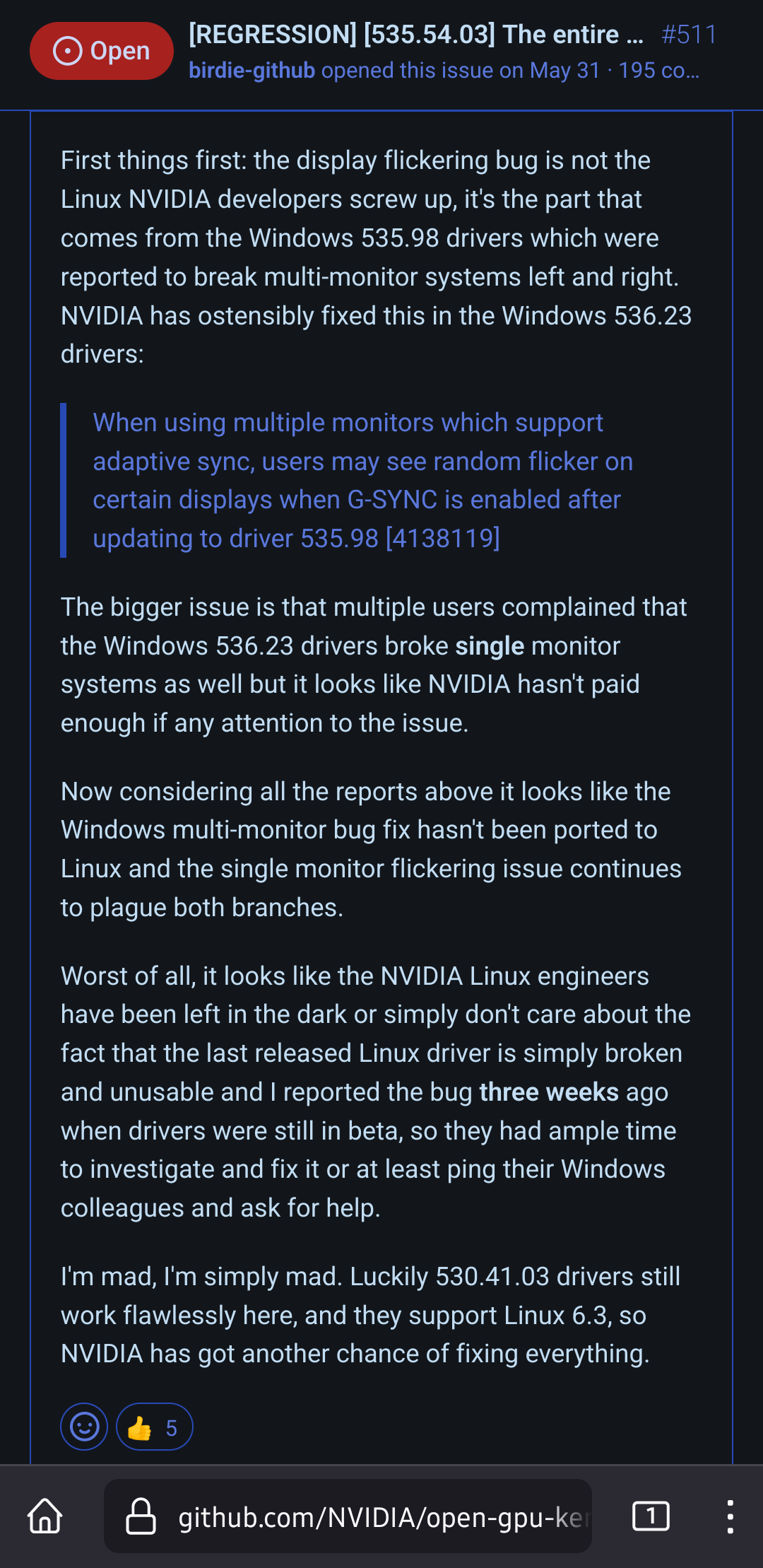- cross-posted to:
- linux_gaming@lemmy.ml
- cross-posted to:
- linux_gaming@lemmy.ml
A set of merge requests were opened that would effectively drop X.Org (X11) session support for the GNOME desktop and once that code is removed making it a Wayland-only desktop environment.
Going along with Fedora 40 looking to disable the GNOME X11 session support (and also making KDE Plasma 6 Wayland-only for Fedora), upstream GNOME is evaluating the prospect of disabling and then removing their X11 session support.
Some concerns were raised already how this could impact downstream desktops like Budgie and Pantheon that haven’t yet fully transitioned over to Wayland. In any event we’ll see where the discussions lead but it’s sure looking like 2024 will be the year that GNOME goes Wayland-only.
Time for Nvidia to step up their driver game… shrugs
I think they already have. I held off on Wayland on my main machine for a long time due to Nvidia issues. For example, I was getting rendering issues where some windows/popups would be totally invisible until I moused over them. Those issues are now gone, and I’ve been running Wayland for the last few months with no problems at all.
yeah, it got better, but still not good enough
i still have issues here and there, i hope they step up.
NVidia won’t do shit until they’re forced to, which is probably why it’s come to this “force everyone over even if its not 100% ready” changeover
They still haven’t solved the problem of a Gnome Shell crash taking down my entire session with it. I need to be able to restart the shell independently of the Wayland compositor for me to switch.
KDE Plasma will get this feature soon, I hope GNOME Shell will follow their approach.
pretty sure the KDE work will be at least partially compatible with other desktops. one of the demos shown was specifically using the feature to swap between Wayland desktops without losing app state
I feel like if Gnome Shell is crashing enough for this to be a problem then it crashing is the actual problem.
Yep. I’m not even using Wayland. Every other day its “Oops, there was a fucky wucky!” And I have to log out. I’m on Cinnamon for now.
ubuntu already compile gnome with the fix(edit: i confused it with triple-buffering, that ubuntu compile gnome with, idk if ubuntu compile gnome with the fix to don’t take down the entire session), but the merge request is there, and it work, idk with gnome didn’t merged it still, maybe other priorities?Do you have a link to this?
Here is an alternative Piped link(s):
https://piped.video/jlDhpFjBWiw?si=lviB5_L85msDVbEH
Piped is a privacy-respecting open-source alternative frontend to YouTube.
I’m open-source; check me out at GitHub.
Oh hey, it’s this months regularly scheduled Wayland drama!
Well let’s hope that massively improves the Wayland experience then. I tried it last week and still had flickering screens, laggy windows, and crashing games. In the current state it would be unacceptable for me to switch
depends if nvidia care about improving wayland, they don’t really have any reason to care today. Maybe if people start purchasing hardware from their competition enough.
I’m having a perfect time on intel at least. Though I have no video game requirements.
My problem is that I’m kinda tied to CUDA and thus Nvidia. If AMD’s ROCm would’ve been a bit better and supported on consumer GPUs I would’ve went for that.
But having a non-NVIDIA card in order to use the latest GNOME doesn’t seem reasonable to me. Then again, maybe the pressure will finally make NVIDIA get their shit together
considering how willing they were to throw vendors like EVGA under the bus, trying to figure out what pressure Nvidia listens too might be a challenge in of of itself …
I’m gonna assume you can use Cuda, without driving the display with nvidia. You just need a motherboard with onboard Intel
That seems like a rather extreme work-around for Wayland proponent delusions. Buying an nvidia card and then not using it for graphics at all.
I was offering solutions to ops problem, is that not allowed?
Funny that people are downvoting when this is what hybrid graphics in laptops do. The iGPU to drive the display and heavier tasks get offloaded to the dGPU
That’s gonna make gaming a lot harder though. And I’m on an AMD CPU. I’m not sure whether it has an internal GPU even. My point is that they’ll lose a lot of users by forcing Wayland. I’m not dure Nvidia will care for such pressure
Yeah, but kde is also heading down the same path. The world can’t keep maintaining a legacy stack forever just because a private company doesn’t care about the problem.
I know people want things to just work and don’t care about the rest but the reality is that unpaid volunteers do 99% of the work and I don’t really think they should have to do extra work just because of nvidia. Maybe nvidia users get left behind, that would suck. I hope nvidia choose to fix their shit instead.
I agree that volunteers shouldn’t have to maintain legacy just because a private company doesn’t have their shit together. But the reality is that a lot of people have Nvidia hardware. If GNOME and KDE will not work on the most popular gaming GPU brand, we’re going to push away a lot of people who are trying to start with Linux but encounter a broken mess.
The solution is: stop making yourself dependent on proprietary companies. You always loose if you wait for someone else rather than taking action. If GNOME wants to improve then it’s pointless for them to wait for Nvidia. Even if that means loosing some Nvidia fans
Sounds like you don’t agree that
“volunteers shouldn’t have to maintain legacy just because a private company doesn’t have their shit together”
you think they should, to avoid pushing people away.
I had the same problems until I switched to an AMD card. Since then it’s been smooth sailing in Wayland.
I had those issues with an old nvdia driver version, bun on the recent ones it works better.
This is great. X11 needs to die in modern DEs so we can all move to Wayland for good.
Fix the issues with wayland so that we are all able to use it, before forcing us to move for “our good”.
In my experience, most of the issues with wayland are caused by
applicationssoftware not supporting it. If we enter a wayland-only world, developers are pushed towards supporting wayland.[This comment has been deleted by an automated system]
It’s not GNOME’s or wayland’s fault that Nvidia refuses to fix their drivers.
[This comment has been deleted by an automated system]
You are correct in saying that there are still several problems in both Wayland (e.g. lack of drawing tablet support) and mutter (e.g. tearing protocol non yet implemented). But then you proceed to list problems that are Nvidia’s fault.
The first is weird, but it probably depends on Nvidia’s kernel driver.
The second is probably a synchronization issue, so it’s probably due to Nvidia refusing to implement implicit sync, and explicit sync not being yet supported in Linux. But don’t quote me on that.
Vulkan should work. But video acceleration is definitely absent, and is listed by Nvidia itself among current driver limitations. Try this.
[This comment has been deleted by an automated system]
Choice is good, but progress always beats choice eventually. That’s just how it is.
What’s everyone’s Wayland showstopper?
I’m holding out for better autoclickers/macro recorders before I go to Wayland
Nvidia
Better Wine support. It’s coming soon, but I prefer xorg until Wine properly supports Wayland.
is XWayland not good enough for that?
I would say Xwayland is good ENOUGH, but it’s not great, my clipboard with xwayland is awful on sway, for example. It works, but not the best.
ah, on Gnome it’s relatively seamless
I recently stopped switching to x11 for gaming. With most games, the performance is 5-10fps better on Wayland
[This comment has been deleted by an automated system]
Honestly, Wayland just doesn’t give the impression of working well enough with everything to replace my window manager and all kinds of utilities that grew around it (or X11 in general) for a decade or two just to only notice after using it for a few weeks that it won’t work with some things. It demands a huge time investment up front for questionable gain basically.
As a multimonitor user with mixed properties, and an AMD user, Wayland has been nothing but a massive gain for me and continues to get better in equally massive strides on KDE (been using kwin-wayland for almost a full year as a daily driver now). It even improved the user experience on my surface pro that I’m running the surface-linux kernel on.
I am not using a Desktop Environment and if switching to Wayland means I will have to give up tiling window managers for DEs I will never switch to Wayland.
The Arch wiki lists more options to choose from: https://wiki.archlinux.org/title/wayland
Considering how many things Wayland apparently still lacks that need to be implemented in each compositor separately a last release in February sounds like a half-dead project.
Sway is based on wlroots and therefore does not need to implement the complete Wayland specification itself. Many other Wayland window managers are also based on wlroots and therefore share a common base (compositor).
Furthermore Sway’s git repo has activity up to a couple of days ago: https://github.com/swaywm/sway/commits/master
Dude, why are you so annoying about this topic? sway is a very good tiling window manager that IIRC two years ago was able to do things X11 based window managers will never be able to (different VRR on multiple monitors) and its basically the reference manager for wlroots, a library implementing the Wayland functionality. I’ve been using Wayland exclusively since about 2021 and I can say all my stuff now works better than under X11. Does it mean everything under the sun works better or is possible? Probably not, but at the same time, the people putting in the work have decided that the old concept was no longer maintainable for them and no one else is willing to pick it up.
Dude, why are you so annoying about this topic?
Because Wayland proponents have been at it for over a decade now pointing at their broken mess saying “look, everything works” and yet somehow the longer these posts stick around the more comments accumulate about things that do not work, and not minor edge cases either but major features like screen recording, games, one of two major graphics cards vendors, remote desktop, significant applications not working,… I am sick and tired of this broken project pretending it is ready to replace X11 over and over and over again.
If they had acknowledged that it was 20% done, 40% done, 60% done (that is maybe where it is now) it would be different but Wayland developers seem to live in their own bubble where “works on my machine sometimes, with half of all applications” is considered done.
Today I can install any game, any application on Linux and know it works with X11, no ifs, no “only on that vendor”, no “only on the latest unreleased bleeding edge version”. Why should I give that up for years of Wayland pain just to get back to where I started minus the things Wayland will never implement like network transparency.
The project you’re looking for is called wlroots, everything will be based on it eventually, the only compositors that aren’t are gnome and kde and that’s because they made their compositors BEFORE wlroots existed.
deleted by creator
Remind me in 2 years /s
The time-investment is short-term pain, long-term profit. That’s kinda our thing as Linux guys
But where it the long-term profit? Every time Wayland comes up in the last 15 or so years since it was first mentioned somewhere it is an endless list of comments about things that don’t work and “will work soon” ™. Meanwhile in all that time there hasn’t been a single exploit for the security issues Wayland claims to fix. X11 has worked just fine for all this time.
I am not opposed to replacing things in general (e.g. I do like systemd and never want init scripts back) but Wayland just seems like a bad design with bad goals and bad implementations.
That talks about typical implementation vulnerabilities. I am talking about the kind of vulnerabilities the Wayland design supposedly protects us from by design.
You do realize you’re comparing wayland to a protocol that doesn’t even make an attempt at stopping keylogging, screengrabbing, or really implements any form of security whatsoever, right? I could make a list but it’d be effort, you should really research this stuff before you spread FUD on accident.
I’m just going to point out that there’s a reason EVERY SINGLE PERSON who worked on X11 has moved onto wayland. Imagine how hard of a sell it’d be for most people to move on from a project that has THIRTY YEARS of work, to redoing everything from scratch, how many people in any other situation would ALL choose rewriting from scratch.
They learned from their mistakes, and that’s why they restarted from scratch.
I have to research more thoroughly what the promised advantages of Wayland are, but from what I’ve heard is that the capability system is much more secure and the architecture is more decentralized, not a single server which takes everything down with it when it breaks.
Anyways, Wayland has a LOT more growth behind it. X is in the process of being deprecated. So I’m pretty sure Wayland must be better in some general way, otherwise it couldn’t have gotten this momentum.
Mine’s mostly just bad electron app support for native Wayland. In theory Electron now offers full Wayland support but hooooo boy is it going to be a while until all of the electron garbage I use finally updates to a new enough version for proper support.
The other gotcha is just general client side decorations support for apps in general. I’m shocked that no one has built a small libadwaita wrapper library that implements client side decorations for apps. It’s going to be ages until app developers all implement their own (crummy) CSD that doesn’t match system themes at all.
You can still use XWayland though, it’s not going anywhere. They are only removing the ability to run a X11-only session.
Yeah, fair - they’re not so much showstoppers as persistent irritations.
There’s this
I play Heroes of the Storm through Lutris.
I have a superultrawide 32:9 monitor.
In X11, I can get HotS to scale past its normal limits just like I could in windows and take up a full 5120x1440 resolution.
In Wayland, I can’t.
I will die on this hill.thy gamescope(that run on steam deck) i think it can scale, if yes, so it’s an implementation issue, that need to be fixed by the compositor
need to be fixed by the compositor
It is a Wayland issue that things like this need to be fixed per compositor. Honestly, what were the designers thinking?
Why should it not be fixed by the compositor, exactly?
As far as I see it, that’s a smart design choice, the issue is just that we needed a universal implementation, an x.org equivalent, and we now have that with wlroots, now that that exists, there’s no downsides to that approach, as far as i’m aware.
In what way exactly does that make it a smart design choice. It sounds like compositor implementers essentially have to work around the bad design choice by including a library and even then each compositor will have to update the dependency version for wlroots each time something needs to be fixed that breaks the wlroots ABI (or for containers, static linking,… just each time).
No, it sounds like compositors will use a library so that they don’t have to do a shitload of work that they’d have to do otherwise.
…this is already how x.org works. You have to implement the x.org server, or create your own implementation of X11.
The only reason you think your criticism doesn’t apply to X.org is because nobody updates X.org anymore… There’s no more breaking changes to be made because it’s a fundamentally broken, shitty protocol.
there is a base implementation basically all compositors are based on
the compositor need to implement the option to change resolution, how could wayland(the protocol) dictate it?, it don’t have a feasible way to do it, what could help is less fragmentation, like using wlroot, but again wayland(protocol) don’t habe a way to dictate it
If they had kept the window manager concept, separating mechanism and policy they would have only needed one implementation for all the mechanisms.
yes, they could have made the implementation from the start, and that is a valid criticism to wayland(i also agree), but we have wlroots now, and they are working very close with KDE(in one of the devs blog they even said about KDE being ported to wlroots in the future), except for gnome, every DE are working together
Color management
This is probably the blocker for me, too. There are some other things but this one just feels amateur.
Autotype for password managers. I don’t only have passwords which I use in my browser for which the plugin is fine. But other apps require autotype. And copy & paste can’t be the solution for this missing feature.
For me personally, none. Until around 2 years ago, it was Nvidia, for Kwin usage on desktop, but before that, I was happily using Wayland sessions and WMs on my laptops for some years
Wayland is my daily driver. The only thing that annoys me is that screen-sharing on Signal Desktop doesn’t work. But that is rather the fault of Signal, making the stupid decision of supporting a deprecated Ubuntu version instead of supporting Wayland fully
I use my laptop for work presentations and running a presentation with embedded videos doesn’t work on external displays.
Probably never gonna happen, given how Wayland is designed.
It’s never going to happen on Wayland level. It’s absolutely no problem to implement this on a compositor level.
or even lower level, they don’t want people running keyloggers without admin permissions
Actually libEI allows for exactly this. It’s very new so not widely supported yet but it’ll definitely get there eventually.
For whatever reason it can’t seem to suspend my thinkpad. Everything crashes and when I open the lid I have to log in again :/
Is that a Wayland issue? Lots of modern laptops have suspend issues (broken S0ix sleep, missing S3, bios declaring wrong states, etc)
I can only assume it’s wayland causing the crash. When I run gnome45 in x11, it suspends and resumes normally, but when I run in wayland upon resume everything is gone, regardless of what was running. I’ve combed through dmesg to find out what’s happening but it hasn’t been too fruitful so far.
What hardware is your Thinkpad? Is it amd?
I found no Remote Desktop solution to be working well together with wayland. (I’m not quite sure, if wayland was the cause of the issues I had with RDP and VNC, have to test that). The proprietary Remote Desktop all show a warning that wayland is not supported. While TeamViewer does kinda work, despite the warning, it is not a very sable connection.
I’ve tried this out, and its promising (KDE Plasma RDP Server). https://planet.kde.org/arjen-hiemstra-2023-08-08-remote-desktop-using-the-rdp-protocol-for-plasma-wayland/
Nice 😃 i currently am a GNOME user (love the animations) but if GNOME on Xorg is no option anymore and GNOME on Wayland still does not work for me, I may have to switch to Plasma on Wayland and use this Thank you very much😇
ironically this is what x11 was originally built for.
I don’t know if this would work for whatever your remote desktop needs are specifically, but I use Sunshine and it works really well.
I have a older iMac running openSuse tumbleweed GNOME and would like to be able waking it up using my iPad an start a remote season in my iPad from my couch/kitchen, so I can watch my child while do some fun linux stuff (I’m relatively new in the scene) First problem is the waking up part: I had to forcefully disable susbend because the screen was always very glitchy upon wake up (open source readon driver). I used this command for that: sudo systemctl mask suspend.target So I have to wake the iMac from off state or find another sleep mode or fix hibernate to solve the issue. I plan to research if there is way to use wakeOnLan for that.
Second problem was the screen remote on wayland which right now resulted in me using teamviewer on GNOME on Xorg. I don’t really like this setup and I’m looking for FOSS alternatives which preferably work on wayland and idealy would allow to ise multytouch gestures.
Lack of window manager and CSD just seems like a downgrade compared to X11, and I have yet to see anything that would be an upgrade that I care about.
Wayland is much better in the long term. People work on it every day and improve it, while X11 gets less and less supported plus X11 is carrying deprecated junk from the last decades
The appeal to “X11 is too complicated, Wayland is much simpler” ain’t holding much meat when we are 15 years into the project and it’s still not done. As it turns out, a lot of that “junk” in X11 is rather useful and cutting out the junk in Wayland just made it unusable. The work to reimplement the missing functionality has been eating up a lot of years.
There’s a reason every single X11 dev decided it would be better to start from scratch than to continue developing X, it’s just fundamentally broken in ways that can’t be fixed, and very few devs were interested in doing the work to make wayland happen until recently, the growth has been massive for development.
That is true that Wayland has cost a lot of time already, much longer than anticipated. Still, Wayland has the organic growth. X11 is declining and will go eventually.
SteamVR doesn’t work on GNOME Wayland because it’s missing DRM (the thing that’s needed to use the display of the VR headset)
i tried rhis autoclicker https://github.com/konkitoman/autoclicker and worked flawless(just needed ticker the suders file because cargo install on .local/bin), but if someone could suggest a macro recorder i appreciate!
The name
What are you, a rival DCL school alumnus? I mean, not Weston obviously, cause that’s a thing. It’s a better name for a display server than Lincoln-Sudbury or Cambridge Ridge and Latin
Or are you just traumatized by the 128/Pike interchange traffic?
Virtual keyboard support
idk what desktop you’re using but GNOME has that built in and it works on Wayland
honestly feels like Wayland won’t get many of the fixes it needs until everyone is forced onto it and sends in bug reports. That’s gonna suck for lots of people including me but maybe it’s now or never
I’m kinda on the fence about it. On the one hand that is how it is supposed to work. That the new thing gets better, faster when everyone uses it. However, I liked to watch this dude named Brodie Robertson on youtube and a lot of the major features took years to land in wayland.
Not because it was hard, no one wanted to do it, or any of the normal reasons you traditionally see in foss. The reason why it took so long usually seems to be the result of having to argue that it should be done. It is honestly mind boggling that things like disabling vsync, global shortcuts, and many other features that many of us take for granted were all initially dismissed as essentially “not even deserving to exist”.
Wayland takes a conservative approach to feature requests. Disabling screen tearing goes against their zero screen tearing goal. Other features, such as X11’s remote capabilities, are unnecessary baggage and a security risk. Yes, people who use the remote capabilities kicked and screamed, but they now have Waypipe. Turns out building that into Wayland itself was unnecessary after all, a 3rd-party app made it happen. Their primary goal is to not end up like the mess that is X11.
These are arguments that should happen, they ensure that things in the protocol are done the right way, else there will be a massive duplication of effort as the protocol changes to something better.
Yeah the political side of FOSS is the most frustrating part for everyone involved. I will say however that at least if Brodie’s videos are to be believed, Wayland is now actually being pushed to make decisions instead of fence-sitting for years (which is easy when your project isn’t hitting crunch time yet)
The politics of FOSS are 100% why I have next to no interest in getting involved beyond small fixes if I come across them.
I’m not going to argue with a bunch of neurodivergent people about good design.
Dude, reading up on the explanation for including a fucking Trash in the freedesktop specification was really eye opening to me.
It’s like these 🧩 honestly need an explanation for why a Trash feature is necessary.
Here it is: https://specifications.freedesktop.org/trash-spec/trashspec-latest.html
but maybe it’s now or never
That’s a real damn shame, because X is causing no issues for me.
It’s weird. As soon as (or even before) something is stable, people are already moving on to the next thing.
That’s a good way to have a broken system in perpetuity.
Unpopular opinion but
WE DO NOT BREAK USERSPACE! Seriously. How hard is this rule to understand?
- Linus Torvalds
Forcing Nvidia to update drivers by breaking your system otherwise us not the correct way to do it.
That’s for the kernel. Userspace often breaks userspace.
Well, there are better reasons for getting rid of fossil software… Like xorg being a giant clusterhack :)
Still not convinced Wayland won’t end up the side-line fossil to be perfectly frank. It just isn’t compatible enough considering how long it has been developed and the “every compositor needs to essentially implement the whole protocol itself” model seems like a huge design flaw.
the “every compositor needs to essentially implement the whole protocol itself” model seems like a huge design flaw.
It’s amazing that wayland have been developed for so long (even though work on the desktop ecosystem is more recent) and this misconception still exists, lemmy need to try to do something to solve Brandolini’s law .
Well, it would certainly help if you explained in what way that is a misconception. I mean obviously they can share part of the implementation via libraries but where else do you see that as a misconception?
Because X11 works the EXACT SAME WAY
every compositor needs to essentially implement the whole protocol itself
This is also how X11 works if you choose not to use x.org… wayland is a protocol, the equivalent you’re looking for is wlroots.
If you use wlroots, you don’t have to do any of that.
As for why kde/wlroots/gnome are separate… x.org used to have multiple implementations too, until one took over and became used everywhere. Wlroots is the equivalent to x.org, and shares many implementation details with kde, gnome is the only odd one out, and both kde and gnomes implementations only exist because they came before wlroots.
User space is not breaking often enough for nvidia users. If it’d break regularly maybe users would either buy something with proper support, or force nvidia to open their stuff so it can be maintained like the rest, and no longer is a roadblock for progress.
nvidia has open-drivers, it’s shit, but they have
(sometimes i go there to laugh)

maybe these push can make nvidia fix the problems
That’s the kernel apis. Those have to be stable. Userland always changes much faster.
Fix the issues with Wayland and everyone will happily make the switch.
Maybe this will help people finally make their apps work on Wayland. I hate so much to install a “privacy-friendly” software or even something related to security and discover it only works under X.
Seems to me that “nothing I try works with Wayland” is not a good point where you want to cut off support for X11. That only means the software doesn’t work with either. Software doesn’t magically gain support for something else just because you cut off the old stuff.
That’s why I said this will help developers consider making their app work under Wayland, not magically gain support.
So what is the name the new GNOME that supports X11?
Edit: I appreciate the alternative desktops, and they are a great reminder (feel free to keep them coming.)
My point was that open source projects tend to fork every time a less than popular decision is made. Often, removing support for something is seen as a less popular decision. I anticipate GNOME will fork over this. I have no inside knowledge and will not be leading the charge.KDE, I suppose.
For now, they’re also slowly weaning off of it.
mate?
Until barrier/synergy works on wayland, I’ve got to stick with X
Input Leap? Now that Barrier is no longer being developed, Input Leap is the main fork, and GNOME 45 just added support for it on Wayland.
Hadn’t heard of this. The Readme says not to use this as it isn’t stable?
give it a try, maybe the devs aren’t confortable to call it stable, but it can work, only testing to know
For me at least, waynergy doesn’t solve my issues, as I host my kb/m on Linux and share with a Windows PC (no builds for windows, and I can’t get it to work with barrier for some reason) I ended up just buying a USB switch which works, but it’s way slower … but I love hyprland so it’s a net gain I guess
Guys, am I the only one?
I dont care about X11. But some weird things just dont work.
I have a stupid AMD mobile GPU which seems to neither support virtualization, nor Wine games.
Also, I only had one keyboard/mouse input at a time, so either shift or running for example. People told me thats because of XWayland.
Is that a thing? This would be a total dealbreaker
AFAIK wine requires no special hardware support. It isn’t virtualizing anything, it just translates directx calls into OpenGL/Vulkan calls executed by your normal driver. If wine doesn’t work I suspect it’s something else
Yes I know. Not sure what it was, installed rocm-opencl, maybe that is helping??
Have you enabled virtualisation support in your BIOS/UEFI? Many vendors ship their hardware with this switched off by default (and some hardware actually doesn’t support it at all).
I don’t have any issues with Xwayland and simultaneous key presses. Tested with Bottles (i. e. WINE), BeamNG (native Linux build) and the games from SCS Software (also Linux-native). I am running Fedora 38 Silverblue with an AMD RX 5500 XT GPU.
Hmm, yes its enabled. This is really weird, a real use case for Coreboot I guess.
This is the best summary I could come up with:
A set of merge requests were opened that would effectively drop X.Org (X11) session support for the GNOME desktop and once that code is removed making it a Wayland-only desktop environment.
Going along with Fedora 40 looking to disable the GNOME X11 session support (and also making KDE Plasma 6 Wayland-only for Fedora), upstream GNOME is evaluating the prospect of disabling and then removing their X11 session support.
This merge request would remove the X11 session targets within gnome-session: "This is the first step towards deprecating the x11 session, the systemd targets are removed, but the x11 functionality is still there in so you can restore the x11 session by installing the targets in the appropriate place on your own.
That was followed by this merge request that would land later on – more than likely, one cycle later – for actually removing the X11 session code.
Some concerns were raised already how this could impact downstream desktops like Budgie and Pantheon that haven’t yet fully transitioned over to Wayland.
In any event we’ll see where the discussions lead but it’s sure looking like 2024 will be the year that GNOME goes Wayland-only.
The original article contains 254 words, the summary contains 193 words. Saved 24%. I’m a bot and I’m open source!
I thought Wayland still didn’t work with nvidia cards?
Its the opposite
Pretty sure Wayland does not just work with nvidia cards.
No its Nvidia that doesnt work with wayland, they need to fix their drivers.
Honestly don’t care who needs to fix something but “works with” is not that kind of relation. Either A works with B and B works with A or neither do. There certainly is no “opposite” involved here.
I think what youre looking for is do they work together
I think they mean Nvida cards don’t work with Wayland - i.e. it’s Nvidia’s fault.
I honestly don’t really care whose fault it is but it is a rather large part of the potential user base that would be cut off by this change.
It works, nowhere near as good as AMD but it works.
https://wiki.gnome.org/Initiatives/Wayland/NVIDIA
https://community.kde.org/Plasma/Wayland/Nvidia somehow supports it even better
According to https://arewewaylandyet.com/ nouveau has support for wlroots and sway






























